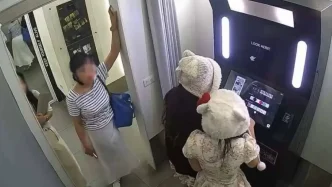In a bid to safeguard children from preventable diseases, Laos has launched an innovative 12-month pilot programme that uses text message (SMS) reminders to alert parents when their child turns one year old and is due for critical vaccinations. Unveiled last week by the Ministry of Health, with support from international partners including the World Health Organisation (WHO), the Australian Government, and Gavi, the Vaccine Alliance, the initiative aims to boost uptake of measles, rubella, and polio vaccines across urban areas of the country.
The programme, managed by the Ministry of Health’s National Immunisation Programme and the Centre for Health Statistics and Information, taps into the national Electronic Immunisation Register (EIR)—a comprehensive database rolled out nationwide in 2024 after development began during the Covid-19 pandemic in 2022. For the first time, EIR data will be used to send targeted SMS reminders to an estimated 50,000 parents whose children reach the one-year mark over the next 12 months, provided they have registered a valid phone number during prior vaccinations.
“This pilot has a promising start,” said Deputy Minister of Health Dr Phayvanh Keopaseuth at the launch event in Vientiane. “These vaccines are crucial for protecting children, and protecting health. Through this pilot, and use of technology, we aim to improve coverage and ensure more children are safeguarded from vaccine-preventable diseases, as unfortunately we often see drops in vaccine coverage as children get older.”
Tackling Declining Vaccination Rates
The initiative specifically targets the second dose of the measles and rubella vaccine (MR2) and the second dose of the inactivated polio vaccine (IPV2), both recommended soon after a child turns 12 months old. Health officials in Laos have long grappled with declining vaccination rates as children age, a trend attributed to forgetfulness, logistical challenges in rural areas, and limited awareness among parents. By delivering timely reminders directly to mobile phones, the Ministry of Health hopes to bridge these gaps and ensure more children complete their immunisation schedules.
The pilot programme focuses on urban areas and cities nationwide, where mobile phone penetration is higher, and encourages parents to provide contact numbers when registering their children in the EIR. Vaccination staff across the country will also play a key role in promoting the scheme by urging new registrants to opt in.
International partners have hailed the initiative as a model of how technology can enhance public health outcomes. “Australia is committed to supporting Laos’ efforts to improve the health and wellbeing of its people,” said Benita Sommerville, Australian Deputy Head of Mission. “This pilot programme is a great example of how technology can be used to enhance immunisation services and protect children from dangerous but preventable diseases.”
A Digital Leap for Public Health
The EIR, which underpins this SMS reminder system, represents a significant digital advancement for Laos’ healthcare infrastructure. Developed with support from WHO, UNICEF, Gavi, and the Government of Japan, the database already includes vaccination records for over 515,000 children. Its deployment during the Covid-19 crisis demonstrated the potential of digital tools to streamline health interventions, and this pilot marks a new chapter in leveraging such technology for routine immunisation.
WHO Representative to Laos, Dr Tim Armstrong, expressed optimism about the programme’s potential impact. “Globally, we have seen the power of SMS reminders for improving vaccination coverage in many areas,” he said. “If successful, the pilot may be expanded to include other vaccinations and approaches.” UNICEF’s Country Representative, Bilal Durrani, echoed this sentiment, noting that “simple, timely reminders can bridge gaps in immunisation coverage, empowering parents with critical information while ensuring that children receive the protection they need to thrive.”
Challenges and Future Prospects
While the initiative has been met with widespread praise, its success is not guaranteed. Mobile phone access remains uneven across Laos, particularly in remote and rural regions where infrastructure lags behind urban centres. The pilot’s focus on cities may limit its immediate reach, though health officials have indicated plans to assess scalability if initial results are positive. Additionally, the effectiveness of SMS reminders hinges on parents’ responsiveness and the accuracy of contact information in the EIR database.
If the programme proves successful, it could pave the way for broader applications, potentially covering additional vaccines or integrating other digital tools like mobile apps or automated voice messages. Such expansions, however, would likely require further investment in infrastructure and public awareness campaigns to ensure inclusivity across Laos’ diverse regions.
There is also the question of long-term sustainability. While international partners have provided critical support for the pilot, the Lao government will need to secure funding and technical expertise to maintain and expand the system beyond the 12-month trial. If confirmed to be effective, the programme could serve as a blueprint for other low- and middle-income countries seeking to modernise immunisation strategies, though no definitive evidence yet confirms its impact.
A Step Towards Healthier Futures
Laos’ SMS vaccination reminder pilot reflects a growing global trend of harnessing technology to address public health challenges. For a country where vaccine-preventable diseases continue to pose a threat to young children, this initiative offers a glimmer of hope. By combining data from the EIR with the ubiquity of mobile phones, the Ministry of Health is taking a proactive step to protect its youngest citizens and build a healthier future.
As the pilot unfolds over the coming year, its outcomes will be closely watched—not just by health officials in Vientiane, but by global health advocates eager to see if this model can deliver measurable results. For now, the programme stands as a testament to the power of collaboration between national governments and international partners, and a reminder of the simple yet transformative potential of a well-timed text message.
















